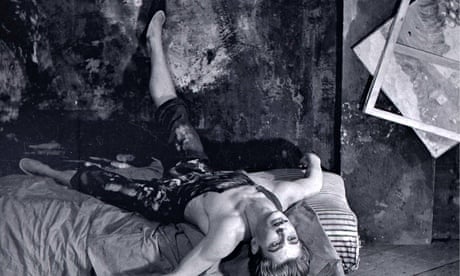The French dancer Jean Babilée, who has died aged 90, was the first great male performer of the postwar generation. Gifted with exceptional natural athleticism underpinned by an excellent classical technique, he possessed an exotic beauty and a charismatic stage presence. His most famous role, the hero of Roland Petit's Le Jeune Homme et la Mort, has been attempted by virtually every male star of recent decades, but none have equalled him either for the athletic brilliance of his dancing or the intensity of his performance. Curiously, as a choreographer he tended to avoid obvious virtuosity in favour of quieter, precise, movement. "Technique is not art," he said.
Intelligent, courteous and approachable, he nonetheless had a highly volatile temperament which could erupt in violent rages, often ending in fisticuffs and even arrests. Essentially he was a free spirit and would happily abandon the theatre to travel to east Asia or North Africa "to find out how people live". He had a passion for high-powered motorbikes, owning and riding one until he was 85, and once rode his motorcycle across the Maghreb desert.
Babilée was born in Paris. His father, René Gutmann, an eminent physician, was of Jewish descent, and his mother, Germaine (nee Babilée), a nurse. From his earliest years the boy practised acrobatics for which he had a natural gift. At the age of 12 he saw his first ballet, a performance of Les Sylphides, and told his mother: "I want to do that." He eventually persuaded his father to let him attend the school of the Paris Opera Ballet. When he joined Gustave Ricaux's class there in 1936, one of his classmates was Petit.
When the second world war broke out, the Gutmann family left Paris for a property they owned in the Gard region, in the south. Babilée then made his way to Cannes, where he took classes with Marika Besobrasova and made his professional debut in the little company she ran, where he swiftly became the main attraction in roles which highlighted his pure classical virtuosity. Some years later the great Danish dancer Erik Bruhn saw him in the virtuoso Bluebird pas de deux and almost abandoned dancing on the spot, convinced that he would never achieve Babilée's standard.
When Germany occupied the free zone, Babilée returned to Paris and joined the Opera Ballet. He avoided being caught in a round-up of Jews due to the kindness of a French official, and it was at this point he adopted his mother's maiden name. But when he was called for compulsory labour in Germany, officials at the Opera dragged their feet in issuing him with the exemption certificate to which he was entitled, and he realised the time had come to leave the city. He made his way to Touraine, where his father was hiding, and joined the Maquis. After France was liberated in 1944, he made his way back to Paris, at one point commandeering a lift with the aid of a gun.
He returned to the Opera, but left in 1946 to join Petit in the Ballets des Champs-Élysées, where he was to create the part of the young man in Le Jeune Homme et la Mort, partnered by his wife Nathalie Philippart as the woman who finally reveals herself as Death. Babilée performed the role all round the world "hundreds of times, nearly always with pleasure". In 1984, aged 61, he was persuaded to reprise it for one last time with Petit's Ballet National de Marseille. Babilée's restless spirit meant that he seldom remained long with one company; he guested with American Ballet Theatre and ran his own company for a few years. He was also in demand as an actor, both in film and on stage. He played the title role in Tennessee Williams's Orpheus Descending and worked with Peter Brook in his production of Jean Genet's The Balcony.
Babilée's last London appearance came in 1973, when, with a group of French actors and musicians including his daughter Isabelle as the Princess, he played the Devil in Stravinsky's The Soldier's Tale. Here he showed himself to be a fine actor, still retaining his exceptional physical ability.
A chance meeting with the choreographer Maurice Béjart in 1979 resulted in another iconic and widely performed role: Life. A meditative pas de trois for Babilée, a young woman and a structure of metal poles on which he climbed and balanced, it created such an effect that both Rudolf Nureyev and Mikhail Baryshnikov were overwhelmed by his performance. As Béjart remarked "He tore up the stage as others tear up your heart".
Babilée is survived by his daughter, his sister Sarah Clair, with whom he collaborated on his biography and his second wife, the dancer and photographer Apolline Marion, known as Zapo.

Comments (…)
Sign in or create your Guardian account to join the discussion